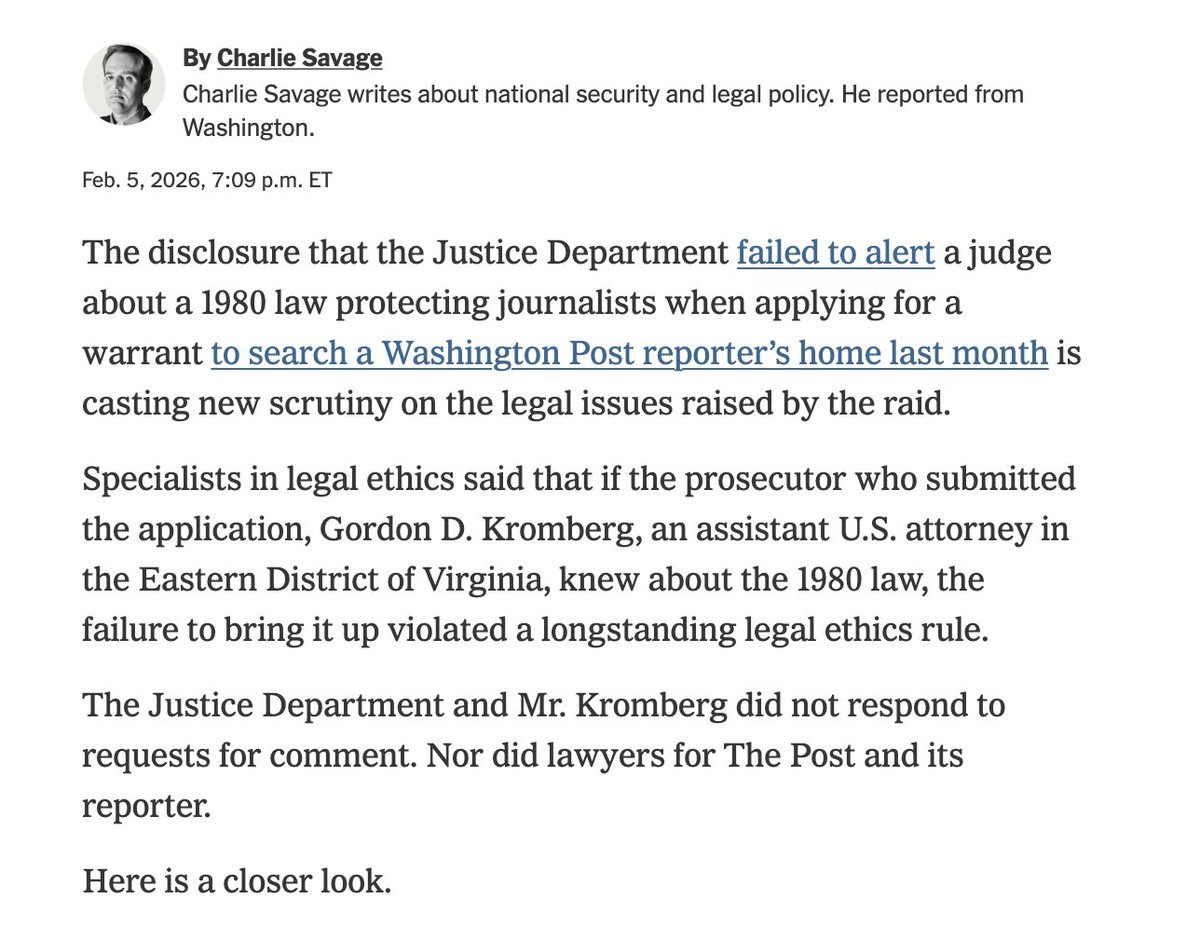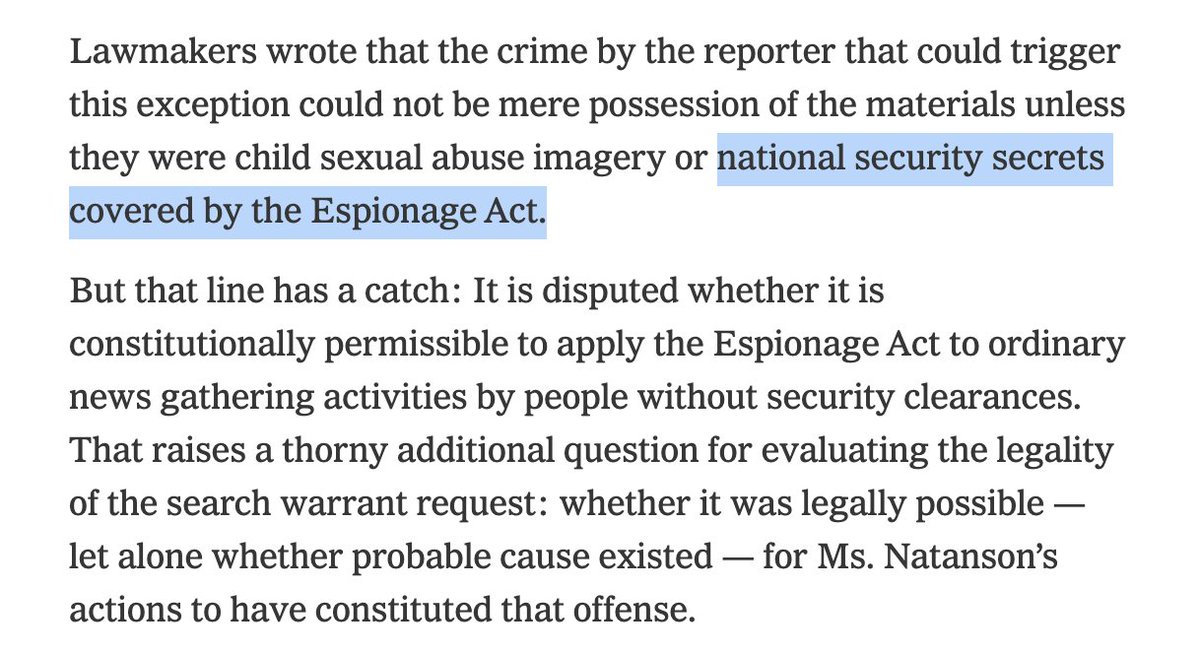Some are arguing, as does @AndrewCMcCarthy below, that the warrant used to search Mar-A-Lago was a general warrant that violates the 4th Amendment.
I think this is incorrect. Here's a thread that explains my view, looking at the relevant caselaw.
🧵
I think this is incorrect. Here's a thread that explains my view, looking at the relevant caselaw.
🧵
https://twitter.com/Acyn/status/1558564658918858759
First, some background. The Fourth Amendment requires that warrants must have a particular description of the evidence or contraband that the government has probable cause to seize. This is part of what is called the particularity requirement. 

The idea is that government searches and seizures have to be limited, and warrants can't be "general." The government can only look for items that they have probable cause to seize, and the warrant only authorizes the seizure of what the government had probable cause to seize.
The claim that the Mar-A-Lago warrant is an unlawful general warrant focuses on a specific phrase in the description of items to be seized.
I understand the disputed language to be in Part C, okaying seizure of "any government . . . Records" during the Trump Administration.
I understand the disputed language to be in Part C, okaying seizure of "any government . . . Records" during the Trump Administration.

"Any government . . . records" is really broad, the argument runs. I mean, 99.9% of "government . . . records" are totally innocuous—not evidence of any crime at all.
Focusing on that phrase, the warrant is general, and therefore violates the Constitution of the United States.
Focusing on that phrase, the warrant is general, and therefore violates the Constitution of the United States.
I think this argument is wrong, though. Here's why.
In cases involving searches for documents, it's the norm for the government not to know the exact form of every document they're looking for. Documents are often described by a combination of their content and their form.
In cases involving searches for documents, it's the norm for the government not to know the exact form of every document they're looking for. Documents are often described by a combination of their content and their form.
So the warrant will describe the category of information that the documents relate to (such as some topic, or evidence of some particular crime), as well as examples of the form they'll take (like the type of document itself).
In Andresen v. Maryland, 427 U.S. 463 (1976), the Supreme Court indicated that these should be construed together. That is, the form of the document named should be read as limited by the category of information.
scholar.google.com/scholar_case?c…
scholar.google.com/scholar_case?c…
In Andresen, the government was searching for docs about a fraudulent real estate transaction. The description of items to be seized added a general phrase in the list of forms: "together with other fruits, instrumentalities and evidence of crime at this [time] unknown." 

The Supreme Court ruled that the warrant was particular because you had to read that general phrase in the list of items as to form as implicitly limited by the earlier language as to substance -- that is, about the suspected real estate transaction. 

Following Andresen, it's not uncommon for a warrant seeking documents to first list the category of information (often, evidence of particular crimes of which there is probable cause) together with a list of the form in which that info might appear.
Under Andresen, the form list is read as implicitly limited by, and read in conjunction with, the preceding description of the substance. The form list limits the category of documents, making it more particular, rather than expands it, making it less particular.
Under Andresen, I think that's how a court would construe the warrant. A list of the crimes sought is usually enough to make a warrant particular. But the Trump warrant goes on to be more particular by listing specific types of documents—to be read in conjunction with the crimes.
Therefore, limiting the scope of the search by naming a particular form the records might take -- in part C, Trump-era government documents -- would not make the warrant general.
An example of this from a similar warrant is US v. Manafort, 314 F. Supp.3d 258 (D.D.C. 2018).
Yes, that's Paul Manafort, DJT's former campaign manager.
Here's the description of the things to be seized used to search his home:
casetext.com/case/united-st…
Yes, that's Paul Manafort, DJT's former campaign manager.
Here's the description of the things to be seized used to search his home:
casetext.com/case/united-st…

Manafort made the same basic argument McCarthy is making. "Any and all financial records" is super-broad, Manafort argued. And all computers is super broad, too. That makes the warrant an unlawful general warrant, he argued. 

The court disagreed, relying on Andresen, construing the form in which the evidence appeared (as financial records, inside computers, etc.) as limited by the preceding description of the the crimes for which there was probable cause to find evidence. 



Seems to me that Trump's warrant is similar to Manafort's warrant -- just substitute "government . . records" during the DJT administration in the Mar-A-Lago warrant for "financial records" in the search of Manafort's house. Similarly constitutional, I think.
To be clear, this doesn't rule out every possible Fourth Amendment challenge to the warrant. When more facts become known, we will have more basis to know if there are any constitutional issues about the warrant.
Based on what we know at this point, though, the claim being made that the "government . . . records" clause violates the Fourth Amendment seems inconsistent with the cases.
(There's also the remedies question, but this thread is long enough....)
/end
(There's also the remedies question, but this thread is long enough....)
/end
• • •
Missing some Tweet in this thread? You can try to
force a refresh





















